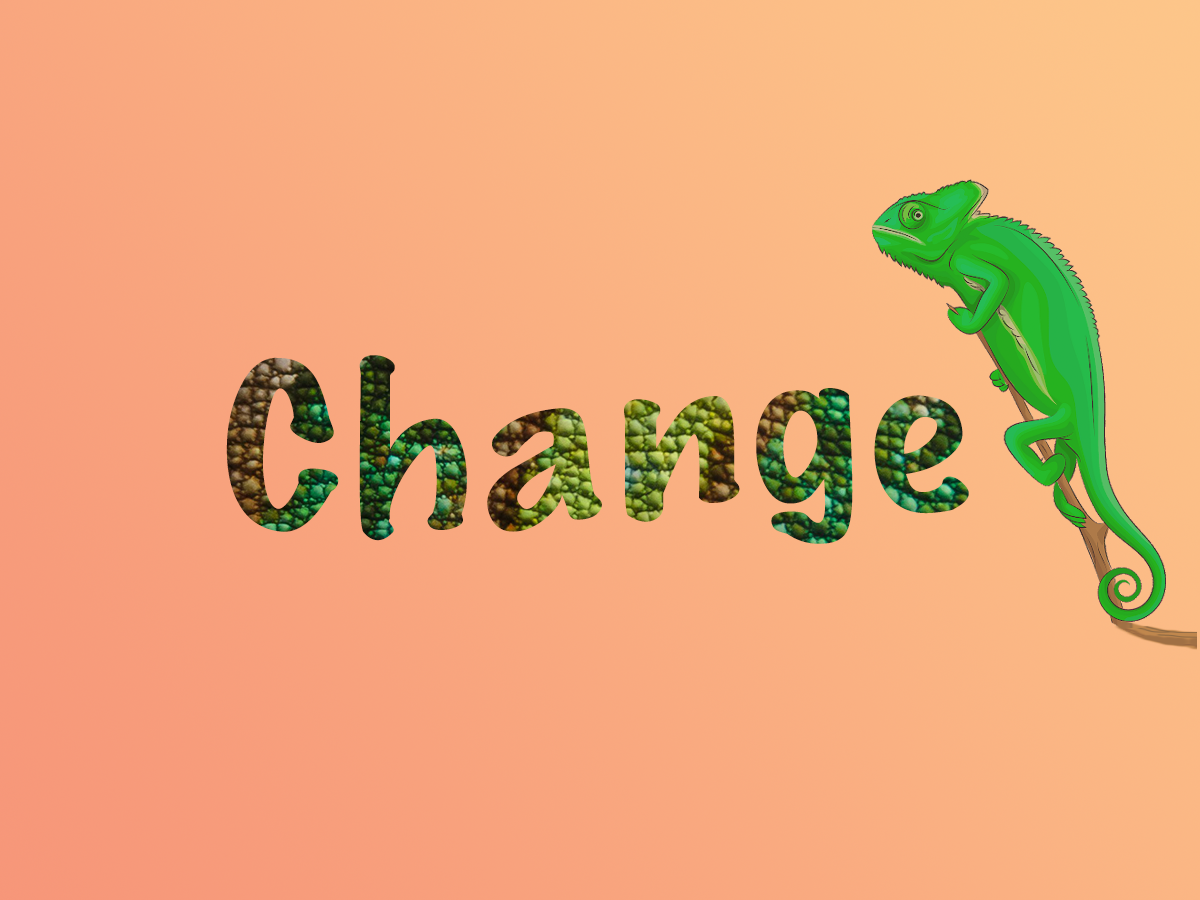With a routine in this pandemic, as abnormal as it is, setting in and even becoming tiresome and redundant, everything is going how I expect it to. The days are predictable and the goals I have set are in sight, albeit far away.
Then, all of a sudden, although predictable, we have our inauguration. And a new American presidency takes the stage with changes coming out of the Executive office left and right. I wonder how will this policy affect us, will we get another stimulus check, when will we get vaccinated…
These are all things outside of our control and although we can see it coming a little ways out, it makes us stressed because it means the current course we are on has to alter.
What do you do?
Do you adapt and change or do you stay on due course? Do you freak out and shrink to the uncertainty or do you rise up and problem solve?
If you struggle to deal with change in your life, then you are not unusual. Change is uncomfortable, frightening, stressful, and, unfortunately, unavoidable.
Adapt to survive
Everything changes, nothing remains without change.
Buddha
Life on this planet is unpredictable and full of changes. Nothing remains in a steady and permanent state. Even solid rocks seemingly immovable and strong break down and are carved with time. (Related: Dealing with Uncertainty).
Throughout time, humans have had to adapt to changing circumstances in order to survive. Though now, there are more changes than ever due to our fast-paced society.
There are more often changes than there are stable states in our lives. Although we may appreciate these steady but brief periods of calm while we have them, soon enough a change will come along to disrupt them.
Most changes are minor and could not be a big deal for you but what about major changes? Finding out that a loved one is diagnosed with a serious illness? Dealing with a sudden quarantine measure?
There are not just negative changes to consider but also positive changes, which can be just as difficult to deal with, and accept1. Change in itself is uncomfortable. We don’t know exactly how our life will be different and so even change due to success or something positive can be stressful.
How to be better at changing
Depending on your personality and attitude, you may be more or less amendable to change. If you fear change, you could be hurting yourself in the long run because you don’t allow yourself to prepare and come up with alternatives.
If you are settling because you don’t want to deal with change, then you could be living a less than satisfactory life. Here are some tips for better dealing with and adapting to change.
Be proactive
In most cases, we can only be so prepared for changes. A lot of times, you will only have a little bit of notice before a change occurs. But even with short notice, adapting proactively is important.
This means looking out into the future for potential upcoming changes that might affect you. Although it is important to be present in your life, scanning the horizon is going to help you better prepare and plan.
People who deal well with change take the time and attention to prepare themselves by looking ahead2.
Looking ahead can give you time to come up with alternative solutions or plans of actions for the impending change.
For example, there was a bit of time where we knew COVID-19 was going to cause a lockdown in our local area but hadn’t affected us yet. During this time, although stressful and uncertain, we could try to gather information, plan, discuss with others, alter our behavior and routines, etc.
Know your purpose
Having a purpose in life will focus your efforts and help make your decisions in your life more consistent. This is difficult to know and it may slightly alter throughout your life but a true purpose will generally stay the same.
Winston Churchill once stated that “purpose guides some people so they don’t get distracted”. Your every day habits can take you closer or further away from your purpose2. (Related: Start a New, Better Habit to Improve Your Life and How to Break a Bad Habit).
This is the same with decisions regarding changing circumstances. When change is inevitable, are you going to deal with it in a way that aligns with your purpose in life?
Along the lines of living with a purpose is taking responsibility for your life choices3. It’ll be easier to know how you want to deal with changes if you have an overarching plan for your life in mind.
Have a growth mindset
Since life is always changing, you’ll need to be adaptable to keep up with it. A mind that is open to change will do better than one that is rigid and stubborn.
Ask questions and learn. Studies show that being inquisitive can help you become more flexible to change and better adapt to new situations2.
From these changes, unexpected or expected, that come up, you may adapt correctly or incorrectly. But from the times that you act incorrectly to change, do you learn or do you settle?
With a growth mindset, you take each experience with an open mind to see it as a lesson to learn from. Others may be resigned to how changes have affected their life and never learn anything from it. But if you never learn, then you don’t grow and soon you’ll be left behind with a stagnant life.
Be resilient
You won’t always come out on top after every change so it is crucial to overcome setbacks and learn from them2. Being able to “bounce back” will make you more resilient over time.
Life is tough and will knock you down at times. We don’t fail until we choose not to get back up. One reason a lot of people don’t like to try again is for fear of looking stupid2.
Another reason is fear of the unknown. Thinking of change is like looking down a dark alley2. When you have to deal with something fearful, it’s natural to want to shrink away. But you’ll have to fight that urge to turn away and hide in order to build resilience.
The more you bounce back after a set back, the more you teach yourself to be resilient to adversity. You can never truly know how a change will affect your life and whether or not the way you adapt to it will be beneficial for your life.
Through resilience, you allow your latest choice or change to not be your last.
Don’t be reactive
It’s important not to be reactive. Why? Well, most changes in your life are going to be due to an outside force, out of your control. That means you did not create the change and you are in the role of reacting to it.
By being reactive, I mean don’t be impulsive. When is the last time an impulse buy made you happy? Being impulsive usually doesn’t fare well in the long run.
Choose how you want to react to changing situations. You will need to acknowledge how a change is making you feel, and by doing so, you’ll give yourself back the control to deal with the situation the way you want to, ultimately making your life yours rather than the sum of outside control.
One way to be less reactive is to know your triggers. What sets you off? What has put you into a blind rage in the past?
When it comes to emotional change, it will likely be the hardest for you to deal with because you are won’t be understanding or have the ability to be objective about the issue1. For example, dealing with a breakup will take time to heal and adapt to. You don’t always need to “solve” every change that comes into your life quickly.
It’s good to give yourself time to process your feelings about a change so you don’t snap react to it and get yourself into more trouble.
Go with the flow

Life is a series of natural and spontaneous changes. Don’t resist them; that only creates sorrow. Let reality be reality. Let things flow naturally forward in whatever way they like.
Lao Tzu3
As Lao Tzu states, life is a series of changes. There is nothing and nowhere that doesn’t change. Life itself embodies change rather than stasis. Just look at a life cycle in which an organism is born, matures, ages, and then dies. Impermanence is the flavor of life and instead of rejecting it, the best thing we can do is embrace it.
Going with the flow of life will allow movement in your own life. Positive changes will bring happiness and negative changes may bring sadness but all of it will be temporary. Especially, if we keep moving and adapting to the changes that continually come into our life.
You really can’t control the change that happens. Just as you couldn’t stop this pandemic from happening. If we were to resist and deny the changes the pandemic brought with it, the consequences would be more serious.
So, rather than avoid the changes that will happen regardless if you accept they are happening or not, take charge and make choices that you have within your power to make.
The whole point of this post is to show you what you still have within your ability to control. Change happens and you deal with it.
If your brain can change, so can you
If you struggle to believe that you can alter how you have been dealing with change, then know this. Neuroscientists have shown that our brains have a good deal of plasticity2. What does this mean?
It means even our brains over time change and adapt. We can learn new things and what we make preference for in our lives is given greater precedent within our brain.
So, can you approach change better? Can you learn to cope with it?
Put in the effort to try. It’ll be worth it.
A happier life is one where you can better adapt to inevitable change and you deserve a full and happier life.
Live happier,
Nicole
How do you deal with changes in your life? Let me know in the comments below!
Want to hear more from us and stay-up-to-date? Follow us on social media!
Get the latest posts in your inbox with our weekly newsletter!
References
- Goldsmith, Barton, Ph.D. Adapting to Change. Psychology Today, 2016 Mar 07. https://www.psychologytoday.com/us/blog/emotional-fitness/201603/adapting-change.
- Jones, Jennifer. How Adaptability Will Help You Deal With Change. TEDxNantwich, 2017 Oct. https://www.ted.com/talks/jennifer_jones_how_adaptability_will_help_you_deal_with_change.
- Sandford, Kathryn. Adapting to Change: Why It Matters and How to Do it. Lifehack, 2021 Jan 12. https://www.lifehack.org/372463/why-you-need-adapt-change.

4 replies on “Change is Inevitable: Why you should adapt to rather than avoid change”
These are some amazing tips, thanks so much for sharing! I’m someone who’s always hated change so these are useful tips for me to be more open and excited for change!
I’m glad you enjoyed and found my post helpful! Change doesn’t have to be scary or a bad thing but I know it’s difficult to deal with. Thanks for reading and commenting!
[…] Change is Inevitable: Why You Should Adapt to Rather than Avoid Change […]
[…] Change is Inevitable: Why You Should Adapt Rather than Avoid Change […]